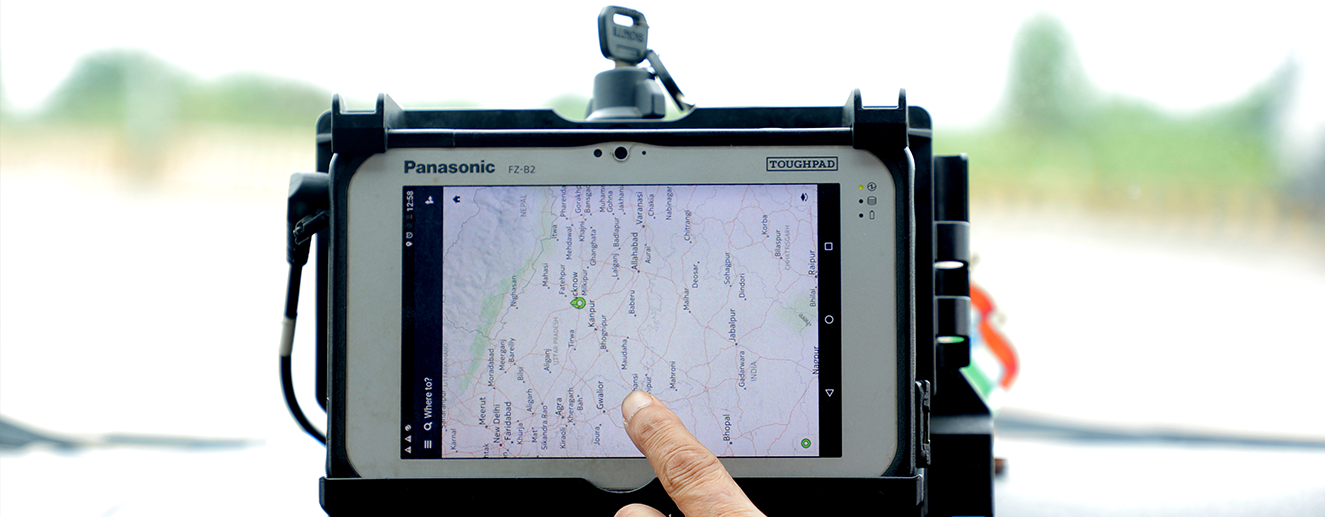The Automotive Industry Standard Committee (AISC), along with the Ministry of Road Transportation and Highways (MoRTH), has come up with AIS, or Automotive Industry Standard. These are a set of guidelines that ensure road safety, while structuring an intelligent transport system at the same time. AIS 140 is aimed at developing better control over transport infrastructure in India. Every commercial vehicle in the country has to be equipped with an AIS 140 compliant GPS tracking device with support for an emergency button accessible by the passengers and driver, along with a robust GPS tracking software to forward a real-time vehicle’s location and other vehicle performance data to proper authorities.
AIS 140 GPS specifications
- Tracking ability using Global Navigation Satellite System (GNSS) – location should be transmitted in real-time. It should also include support for GAGAN, the Indian Satellite Based Augmentation System.
- A panic button is a must – it should be easily accessible so that authorities are alerted quickly as and when required.
- Two different IP addresses – one set of data (PVT data) should be transferred to the first IP address for regulatory purposes, while the second IP address is exclusively for the emergency request system.
- GPS device to support 4 digital, 2 analog and 1 serial communication (RS232) for interfacing external systems or peripherals ( for instance, the panic button – SOS buzzer).
- An internal battery has a backup of minimum 4 hours, taking into account location update frequency at 60 seconds.
- It should be able to transmit position, velocity and time (PVT) data to the back-end control room using the GSM/GPRS network.
- The device has to come with an embedded SIM.
- If there is GPRS failure, a configurable backup SMS feature needs to be present, along with the ability to receive firmware updates over the air.
- Lastly, the AIS GPS device should be totally tamper-proof, so no one can disable it. The device has to be resistant to dust, temperature and water splashes too.
Which industries benefit from installing AIS 140 devices?
Commercial fleet owners
Be it trucks, buses, taxis, or logistics companies, all organizations that own and manage fleets of commercial vehicles, can benefit from these GPS trackers. They help in monitoring vehicle movements, optimizing routes, and ensuring compliance with government regulations.
Transportation and logistics companies
Businesses involved in transportation and logistics are extremely dependant on AIS 140 GPS trackers to keep tabs on cargo, ensure on-time deliveries, and maintain vehicle safety and compliance.
Government agencies
Government bodies responsible for supervising transportation systems, road safety, and compliance often mandate these trackers to ensure the safety and regulation of commercial vehicles.
Educational institutions
They use fleets of buses for student transportation – these trackers ensure that students are safe, while continuously monitoring bus routes and tracking location of vehicles in real-time.
Emergency services
First responders such as the police, ambulance, and fire departments use these trackers in their vehicles to take action quickly during emergencies and optimize response times.
Construction and infrastructure companies
Companies involved in construction and infrastructure projects use these trackers to monitor the location and usage of heavy equipment and vehicles on job sites.
Private vehicle owners
An AIS 140 device isn’t mandatory for private vehicles, but individuals may choose to install GPS trackers for added security, tracking, and anti-theft measures.
AIS 140 FAQs
What sectors must have AIS 140 devices?
As per the mandate issued by the Government of India, the following must adopt an AIS 140 GPS tracking device:
- State Road Transport Corporations
- Domestic and Interstate Private Bus Operators
- Ambulances and Emergency Response Vehicles
- Cars, Bus and Taxi Fleet Owners
- Rent-a-Car Services
- Taxi Ride Hailing Services
How is AIS 140 beneficial for transport systems in India?
Compliance with AIS 140 standards can ensure passenger safety, while allowing authorities to respond quickly to incidents. It improves public transport operations via real-time tracking, monitors performance metrics for vehicles, and keeps tabs on drivers to ensure they are indulging in safe driving and following road safety rules. The geo-fencing feature allows creation of virtual boundaries, and alerts are instantly triggered if vehicles enter or exit pre-defined areas. It ensures that drivers aren’t deviating from their routes or running personal errands on duty. Yet another benefit is that the data recorded by these AIS 140 devices can offer insights into vehicle operations, including routes, idle time, fuel consumption, running kilometers and overall performance.
Why is such a mandate required?
A couple of unfortunate incidents that compromised the safety of occupants in public transport vehicles have prompted the Government of India to rigorously enforce AIS 140 standards.
What are the major challenges of vehicles being declared AIS 140 compliant?
- There are two wireless technologies (GNSS and GSM/GPRS) and their antennas, involved here, so due caution has to be exercised during the installation of devices in vehicles. In the case of GNSS, the installation is even more important, as compared to GSM, since the signal strength of GNSS is weaker. It should be ensured that the device is installed at a place with proper visibility and minimal obstructions. There shouldn’t be any metallic surfaces in surrounding areas as they might interfere with the performance of the antennas and also have a significant impact on the location accuracy.
- The device has to be connected to the vehicle battery directly or via ignition, so the routing of wiring is integral in minimizing accidental damage to harness and electro-magnetic interference.
What is the penalty for non-compliance?
Penalties usually vary from state to state. Offenders might have to shell out hefty sums, or face suspension of the vehicle registration. In extreme cases their vehicle permit could be cancelled.
To put it in a nutshell, AIS 140 standards are formulated and implemented mainly to ensure the safety of people travelling in public transportation systems. Features such as GPS tracking, panic buttons and real time monitoring allows concerned authorities to respond quickly to emergency situations and ensure safe and reliable public transportation.

 Global
Global Australia
Australia India
India





Write a comment
Your email address will not be published. All fields are required